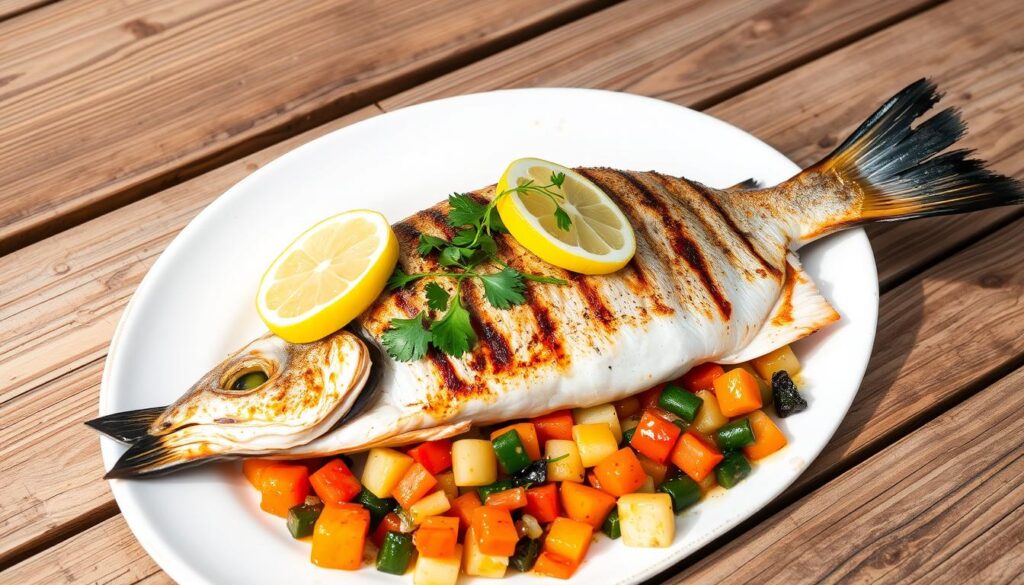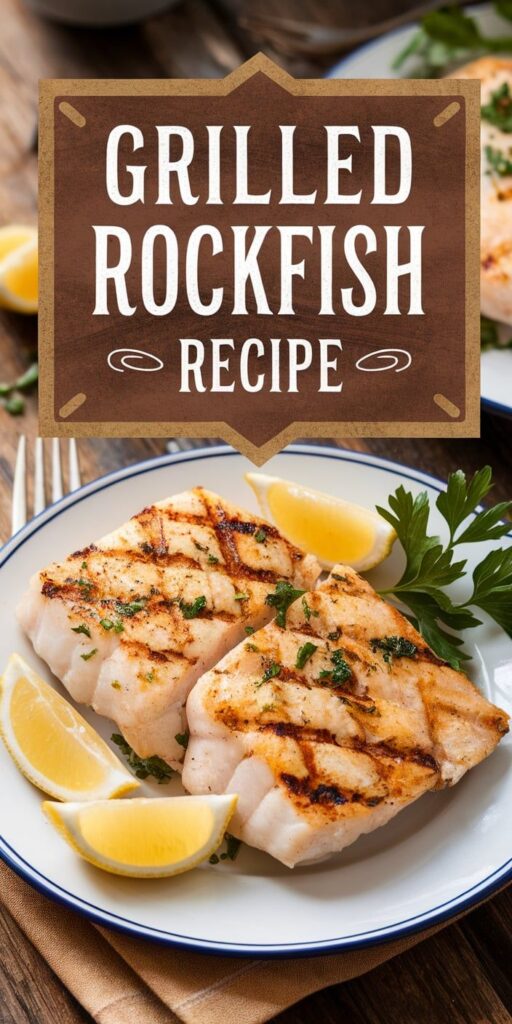Get ready to savor the delectable flavors of a perfectly grilled rockfish. This simple yet delightful recipe is a must-try for seafood enthusiasts seeking a healthy and convenient dinner option. Rockfish, also known as Pacific Snapper, is a versatile white-fleshed fish that cooks quickly and boasts a mild, sweet taste that the entire family will enjoy.
With its quick cooking time and impressive nutritional profile, grilled rockfish is an excellent choice for a weeknight meal or a special weekend gathering. Whether you’re a seasoned grill master or a novice home cook, this recipe will guide you through the steps to achieve mouthwatering results every time. Get ready to savor the delectable flavors of this easy grilled rockfish dish that’s sure to become a new family favorite.
Introduction to Rockfish and Its Culinary Appeal
Rockfish, a diverse and versatile variety of seafood, has captivated the culinary world with its delectable flavors and impressive nutritional profile. From the Pacific rockfish to the Atlantic striped bass, this family of fish offers a wide range of options for the discerning griller.
Different Types of Rockfish for Grilling
Rockfish species renowned for their exceptional grilling qualities include the Pacific rockfish, also known as rock cod or Pacific red snapper, and the Atlantic striped bass. These fish boast firm, flaky flesh that holds up beautifully to the high heat of the grill, making them a popular choice among chefs and home cooks alike.
Nutritional Benefits of Rockfish
- High in Protein: Rockfish are an excellent source of lean, high-quality protein, making them a healthy and filling choice for any meal.
- Rich in Omega-3 Fatty Acids: These fish are brimming with heart-healthy omega-3 fatty acids, which have been linked to a variety of health benefits, including reduced inflammation and improved cardiovascular function.
- Low in Mercury: Compared to some other types of seafood, rockfish are relatively low in mercury, making them a safe and sustainable option for regular consumption.
Whether you’re grilling up a flavorful Pacific rockfish or savoring the succulent flesh of an Atlantic striped bass, the versatility and nutritional value of rockfish make it a truly remarkable culinary choice.
Essential Equipment for Grilling Rockfish
When it comes to grilling delectable rockfish, having the right set of tools and equipment is crucial. From ensuring a pristine grill grate to monitoring the internal temperature, each piece of gear plays a vital role in achieving the perfect sear and flaky texture. Let’s dive into the essential grilling tools you’ll need to master the art of outdoor rockfish cooking.
Grill Grate and Basket
A clean, well-oiled grill grate is the foundation for searing your rockfish to perfection. For extra stability and ease of handling, consider investing in a sturdy fish grilling basket or plank. These specialized tools keep your delicate fillets intact while allowing for even cooking.
Long-Handled Tongs
Long-handled tongs are a must-have for any grilling enthusiast. These handy tools allow you to safely turn and maneuver your rockfish without compromising the delicate flesh or risking burns from proximity to the hot grates.
Meat Thermometer
Ensuring your rockfish is cooked to the optimal internal temperature is crucial for food safety and flavor. A reliable meat thermometer takes the guesswork out of the equation, allowing you to monitor the fish’s doneness and pull it off the grill at the perfect moment.
| Grilling Tool | Purpose |
|---|---|
| Clean Grill Grate | Provides a sturdy, non-stick surface for searing rockfish |
| Fish Grilling Basket or Plank | Keeps delicate fillets intact during cooking |
| Long-Handled Tongs | Allows for safe turning and maneuvering of the fish |
| Meat Thermometer | Ensures the rockfish is cooked to the perfect internal temperature |
By equipping yourself with these essential grilling tools, you’ll be well on your way to creating mouthwatering, restaurant-quality grilled rockfish in the comfort of your own backyard. With the right gear and a little practice, you’ll be serving up perfectly cooked, flavorful seafood every time.
Selecting the Perfect Rockfish for Grilling
Choosing the right rockfish is crucial for achieving a mouthwatering grilled dish. Whether you prefer fresh or frozen, understanding the quality indicators and proper storage methods can make all the difference in your culinary experience.
Fresh vs. Frozen Rockfish
When it comes to rockfish, both fresh and frozen options can be excellent choices. Fresh rockfish offers a delicate, delicious flavor, but the window of freshness can be limited. Frozen rockfish, on the other hand, is often flash-frozen at the peak of freshness, locking in its natural flavors and nutrients. The choice between fresh and frozen often comes down to personal preference and availability.
Quality Indicators to Look For
- Bright, clear eyes (for fresh rockfish)
- Firm, resilient flesh that springs back when gently pressed
- Vibrant, glossy skin with no discoloration or signs of drying
- Fresh, ocean-like aroma with no fishy or unpleasant odors
Proper Storage Tips
To ensure your rockfish stays fresh and ready for grilling, follow these storage guidelines:
- Fresh rockfish: Store on ice or in the coldest part of your refrigerator, and consume within 1-2 days of purchase.
- Frozen rockfish: Keep in the freezer at 0°F or below and use within 3-6 months for best quality and flavor.
- Thaw frozen rockfish in the refrigerator, not at room temperature, to maintain freshness and food safety.
| Characteristic | Fresh Rockfish | Frozen Rockfish |
|---|---|---|
| Flavor | Delicate, fresh taste | Maintains peak freshness flavor |
| Shelf Life | 1-2 days | 3-6 months |
| Texture | Firm, resilient flesh | Firm, retains texture after thawing |
| Nutrients | Highest nutrient content | Retains most nutrients when properly frozen |

Ingredients for Grilled Rockfish Recipe
Preparing a delectable grilled rockfish dish starts with the right ingredients. From the fresh rockfish itself to the flavorful marinade and seasoning, each component plays a crucial role in elevating the overall taste and texture. Let’s explore the essential ingredients needed to create a mouthwatering grilled rockfish recipe.
At the heart of this recipe is the star ingredient – the rockfish. Look for fresh, high-quality rockfish fillets that are firm, moist, and free of any discoloration or strong fishy odor. For the marinade, you’ll need a combination of rockfish marinade ingredients such as olive oil, lemon juice, garlic, and your choice of fresh herbs like parsley, dill, or thyme.
To add an extra layer of flavor, consider using a grilled fish seasoning or creating your own herb rub. A simple blend of salt, pepper, paprika, and any other desired herb rub for rockfish can work wonderfully. Remember, the key is to strike a balance between the natural sweetness of the rockfish and the complementary seasonings.
| Ingredient | Quantity |
|---|---|
| Rockfish fillets | 4-6 pieces |
| Olive oil | 1/4 cup |
| Lemon juice | 2 tablespoons |
| Garlic, minced | 2 cloves |
| Fresh parsley, chopped | 1/4 cup |
| Salt | 1 teaspoon |
| Black pepper | 1/2 teaspoon |
| Paprika | 1 teaspoon |
With these key ingredients at hand, you’ll be well on your way to creating a delicious and flavorful grilled rockfish dish that’s sure to impress your family and friends.
Preparing Your Rockfish for the Grill
Properly preparing your rockfish before grilling is the key to achieving a delicious, flavorful dish. Let’s dive into the essential steps to clean, scale, and marinate your rockfish for the ultimate grilled feast.
Cleaning and Scaling Tips
Begin by rinsing the rockfish under cold running water. Use a sharp fillet knife to gently scale the fish, working from tail to head to remove any remaining scales. Thoroughly pat the fish dry with paper towels, ensuring the surface is completely dry before seasoning or marinating.
Marinade Preparation Steps
Creating a flavorful marinade is a great way to infuse your rockfish with irresistible taste. Here’s how to prepare the perfect marinade:
- In a shallow baking dish or resealable plastic bag, combine the marinade ingredients, such as olive oil, lemon juice, garlic, herbs, and spices.
- Gently place the prepared rockfish fillets into the marinade, ensuring they are fully submerged.
- Cover the dish or seal the bag and refrigerate for at least 30 minutes, or up to 2 hours, to allow the flavors to penetrate the fish.
Remember to turn the fillets occasionally during the marinating process for even coverage. This simple step will result in a perfectly seasoned and juicy grilled rockfish.
Perfect Marinade Options for Rockfish
When it comes to grilling rockfish, the right marinade can make all the difference in enhancing the natural flavors of this delectable seafood. From classic citrus-herb blends to bold Cajun-inspired marinades, there are a variety of options to explore. Let’s dive into some flavorful marinade recipes that will elevate your grilled rockfish experience.
Citrus Herb Marinade
This bright and refreshing marinade combines the zesty notes of lemon and orange with a blend of fragrant herbs. Simply whisk together fresh lemon and orange juice, olive oil, minced garlic, chopped parsley, dill, and a pinch of salt and pepper. Allow the rockfish fillets to marinate for at least 30 minutes before grilling for a delightful citrus-infused flavor.
Asian-Inspired Soy-Ginger Marinade
Bring an exciting twist to your grilled rockfish with this Asian-inspired marinade. In a bowl, mix together soy sauce, rice vinegar, sesame oil, freshly grated ginger, minced garlic, and a touch of brown sugar. Let the rockfish soak in this savory-sweet marinade for up to an hour before grilling for a mouthwatering, umami-forward dish.
Spicy Cajun Marinade
For those who crave a bold and flavorful experience, the spicy Cajun marinade is sure to deliver. Combine Cajun seasoning, olive oil, lemon juice, and a pinch of cayenne pepper. Allow the rockfish fillets to marinate for at least 45 minutes, then grill to perfection for a delightful balance of heat and robust seafood flavor.
| Marinade | Key Ingredients | Marinating Time |
|---|---|---|
| Citrus Herb | Lemon, orange, parsley, dill | 30 minutes |
| Soy-Ginger | Soy sauce, rice vinegar, ginger | 1 hour |
| Spicy Cajun | Cajun seasoning, lemon, cayenne | 45 minutes |
Experiment with these delicious marinade options to find your perfect flavor combination for grilled rockfish. Whether you prefer a citrusy, Asian-inspired, or spicy Cajun profile, these marinades are sure to elevate your grilling experience and bring out the best in this versatile seafood.
Step-by-Step Grilled Rockfish Recipe
Grilling rockfish is a delightful way to enjoy its delicate flavor and flaky texture. To achieve the perfect grilled rockfish, follow these easy steps:
Preheating and Grill Setup
Start by preheating your grill to medium-high heat, around 400-450°F (200-230°C). This ensures the grill is hot enough to sear the fish and create those sought-after grill marks. Once the grill is hot, clean the grates and lightly oil them to prevent the fish from sticking.
Cooking Time and Temperature Guide
The ideal grilling time for rockfish is around 8-12 minutes, depending on the thickness of the fillets. As a general rule, grill the fish for 4-6 minutes per side, or until it’s opaque and flakes easily with a fork. Use a meat thermometer to ensure the internal temperature reaches 145°F (63°C) for food safety.
Flipping Techniques
- Gently flip the rockfish fillets using a sturdy spatula, being careful not to break the delicate flesh.
- Avoid flipping the fish more than once during the cooking process to maintain its integrity.
- If the fish is sticking to the grates, resist the urge to force it off. Instead, let it cook for a bit longer, and it will release naturally when it’s ready.
By following these step-by-step instructions, you’ll be able to grill delicious and perfectly cooked rockfish every time. Enjoy the flavorful results of your grilled rockfish recipe!
Side Dishes That Complement Grilled Rockfish
When it comes to creating a complete and satisfying seafood meal, the sides you choose to accompany your grilled rockfish can make all the difference. These complementary dishes not only enhance the flavor of the fish but also add a delightful variety of textures and colors to your plate.
One popular option is to pair your grilled rockfish with a vibrant and fresh vegetable side. Consider grilling or roasting a medley of seasonal vegetables such as zucchini, bell peppers, and asparagus. These “sides for grilled fish” can be tossed in a light vinaigrette or seasoned with herbs and spices to create a flavorful and visually appealing accompaniment.
For a heartier option, a fragrant rice pilaf or a simple lemon-herb couscous can provide a perfect base for your grilled rockfish. These “vegetable pairings” not only soak up the delicious juices from the fish but also offer a satisfying starch component to your “complete seafood meal”.
Finally, a refreshing salad can be the perfect foil to the richness of the grilled rockfish. Consider a crisp mixed greens salad with cherry tomatoes, cucumber, and a tangy vinaigrette, or a vibrant citrus salad with segments of grapefruit and orange.
By carefully selecting side dishes that complement the flavors and textures of your grilled rockfish, you can create a well-balanced and truly satisfying meal that will delight your taste buds.
Tips for Achieving Perfect Grill Marks
Grilling rockfish can be a delightful experience, but achieving those coveted grill marks requires a bit of technique. The key to perfect grill marks lies in managing the temperature of your grill and avoiding common mistakes that can lead to sticking or uneven cooking.
Common Grilling Mistakes to Avoid
- Overcrowding the grill: Placing too many pieces of fish on the grate can prevent proper heat circulation and lead to uneven cooking.
- Insufficient preheating: Failing to preheat the grill thoroughly can result in fish sticking to the grate.
- Improper oiling of the grate: Neglecting to oil the grate can cause the fish to adhere to the surface, compromising those beautiful grill marks.
- Frequent flipping: Resist the urge to constantly flip the fish, as this can disrupt the searing process and prevent the formation of grill marks.
Temperature Control Techniques
Maintaining the right temperature is crucial for fish grilling techniques and achieving perfect grill marks. Follow these temperature control tips:
- Preheat the grill to a high temperature (around 450°F to 500°F) to ensure a hot, searing surface.
- Use a grill thermometer to monitor the temperature and make adjustments as needed to prevent fish from sticking.
- Create a two-zone fire by placing hot coals on one side and leaving the other side cooler for indirect cooking. This allows you to sear the fish on the hot side and then move it to the cooler side to finish cooking without burning.
- Resist the temptation to repeatedly open the grill lid, as this can disrupt the grill temperature control and lead to uneven cooking.
By mastering these tips and techniques, you’ll be well on your way to grilling up rockfish with stunning, restaurant-quality grill marks every time.
Serving Suggestions and Presentation Ideas
Elevating the visual appeal of your grilled rockfish is just as important as the cooking process. After perfectly grilling your rockfish, it’s time to showcase your culinary prowess through creative plating and presentation. Let’s explore some mouthwatering serving suggestions and presentation tips to make your rockfish dish truly shine.
One of the keys to an attractive seafood presentation is utilizing vibrant and complementary garnishes. Try adorning your grilled rockfish with a sprinkle of freshly chopped parsley, dill, or chives. These green herbs not only add a burst of color but also infuse your dish with a delightful aromatic touch.
For a visually striking presentation, consider arranging your grilled rockfish fillets in an overlapping pattern on the serving plate. This not only creates an eye-catching display but also highlights the flaky, moist texture of the fish. You can further enhance the presentation by drizzling a citrus-based sauce or compound butter over the fish, allowing the flavors to mingle and the visual appeal to be enhanced.
Complementary side dishes can also play a significant role in elevating the overall presentation of your grilled rockfish. Consider pairing it with a vibrant slaw made with shredded cabbage, carrots, and a tangy vinaigrette. Or, serve the rockfish atop a bed of fluffy white rice or quinoa, with grilled or roasted vegetables arranged around the perimeter of the plate.
Remember, the key to an attractive seafood presentation is to strike a balance between bold flavors and visually appealing elements. By incorporating these serving suggestions and presentation ideas, you can transform your grilled rockfish into a true culinary masterpiece that will impress your guests and satisfy their taste buds.

Storing and Reheating Leftover Grilled Rockfish
Properly storing and reheating your leftover grilled rockfish is crucial for preserving its delicious flavor and ensuring food safety. To store the fish, place it in an airtight container or wrap it tightly in plastic wrap or aluminum foil. Refrigerate the leftovers at 40°F or below, and consume them within 3-4 days for optimal freshness and quality.
When it’s time to reheat your grilled rockfish, resist the temptation to use the microwave, as this can dry out the delicate fish. Instead, try reheating it in a skillet on the stove over medium heat. Add a splash of water or broth to the pan, cover it, and heat the fish until it’s warmed through, being careful not to overcook. Alternatively, you can reheat the fish in a 350°F oven for 10-15 minutes, keeping a close eye to prevent it from becoming dry or rubbery.
It’s important to remember that food safety should always be a top priority when handling leftover seafood. Discard any grilled rockfish that has been left at room temperature for more than two hours, or if it exhibits signs of spoilage, such as an off odor or discoloration. By following these simple storage and reheating guidelines, you can enjoy the delicious flavors of your grilled rockfish long after the initial meal.





